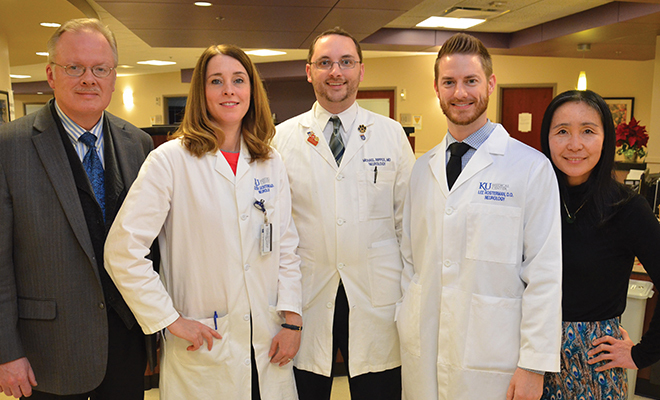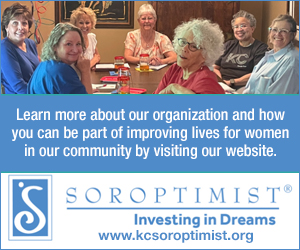 Mike Glynn
Mike Glynn
Spotlight on the University of Kansas Hospital’s Advanced Comprehensive Stroke Center
Two million brain cells are dying every minute while an individual is suffering a stroke. That’s a horrific number and speaks volumes to the importance of receiving immediate care. In the KC-metro area, we can turn to The University of Kansas Hospital’s Advanced Comprehensive Stroke Center for excellent treatment and outcomes.
The Advanced Comprehensive Stroke Center provides diagnosis, treatment and education to meet the unique, specialized needs of stroke patients, helping them recover and reducing the risk of future strokes. With the right care at the right time, it may be possible to actually reverse a stroke.
Technology for Complex Cases
“Every patient experiencing a stroke deserves the hope of a full recovery and the best possible outcome. That is why we’re dedicated to providing the latest technology, newest therapies and a 24/7 stroke team for all stroke cases. We have board-certified stroke neurologists that are on call 24/7,” noted Colleen Lechtenberg, MD, medical director of the stroke program at The University of Kansas Hospital. “As an Advanced Comprehensive Stroke Center, we treat the most complex stroke cases in the region. We are also proud to be part of the only nationally ranked neurology and neurosurgery program in the state and region, recognized by U.S. News & World Report.”
Dr. Lechtenberg and her team at The University of Kansas Hospital offer an extensive array of knowledge and experience in the diagnosis and treatment of strokes. She is board certified in neurology with a sub-certification in vascular neurology. She received her education and fellowship training at The University of Kansas School of Medicine.
Immediate Treatment is Optimal
When you or your loved one is suffering a stroke, time is critical. Dr. Lechtenberg notes the most effective acute stroke treatments can only be used in the first few hours after the stroke symptoms start. “When you recognize stroke symptoms, call 911 and get to the hospital immediately because treatment is so time dependent. Stroke patients may not be eligible for the most effective treatments if they don’t arrive at the hospital in time,” remarked Dr. Lechtenberg.
“In the best case, they arrive as they are having the stroke. The team can do stroke intervention and possibly reverse or lessen the symptoms of the stroke. Many times a patient arrives too late to be eligible for stroke reversal therapy. The focus then shifts to understanding the cause of the stroke to prevent this from happening again.”
Upholding High Joint Commission Standards
The Advanced Comprehensive Stroke Center has been certified by The Joint Commission, a national independent accrediting board. In fact, it was the first in Kansas City to achieve this impressive recognition in 2012. The certification recognizes the Center’s quality care, outcomes and emphasis on collaboration among doctors, nurses and researchers. It’s focused on delivering the most advanced care possible, quickly and efficiently.
“We were one of the first five hospitals in the country to obtain this designation,” stated Dr. Lechtenberg. “It signifies that we have the people, infrastructure, equipment, training and research to address stroke treatment for our patients in the most straightforward manner.”
Education and Awareness are Key
Someone in the U.S. suffers a stroke every 40 seconds, totaling 795,000 people each year. About 185,000 of those are recurrent strokes. Stroke is the fifth leading cause of death. Strokes can happen at any age but they are more common with the elderly. They’re terrifying to suffer because they’re the number one cause of disability and potentially result in paralysis, blindness, diminished speech and more.
Dr. Lechtenberg urges everyone to understand the signs and symptoms of a stroke. The symptoms of stroke are typically sudden in onset, but a person suffering one will probably have one or more of these symptoms:
Numbness or weakness in the face, arm, or leg, especially on one side
Confusion or trouble understanding other people
Trouble speaking
Trouble seeing with one or both eyes
Trouble walking or staying balanced or coordinated
Dizziness
Severe headache that comes on for no reason
Stay Proactive
But for Dr. Lechtenberg, the most important message is one of prevention. “Work with your primary care doctor to address your risk,” she stressed. “Don’t smoke, watch for diabetes, and lower your cholesterol and blood pressure. Exercise and watch your weight. Ensure you’re eating a healthy diet.”
If your loved one is suffering a stroke, it’s critical they have immediate medical care. Remember, seconds count. Get them to The University of Kansas Hospital’s Advanced Comprehensive Stroke Center to ensure they’re receiving the best care possible, delivered by an excellent team of medical professionals. HLM Photographs by Mike Glynn, The University of Kansas Hospital
Learn more about the Comprehensive Stroke Center at kumed.com/stroke or call 913-588-1227.









